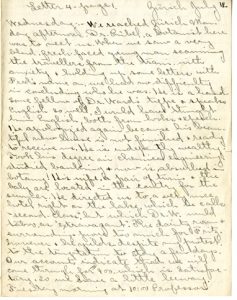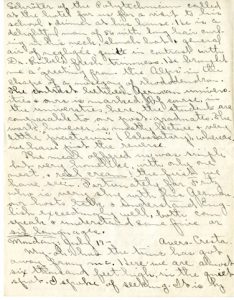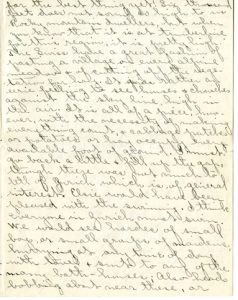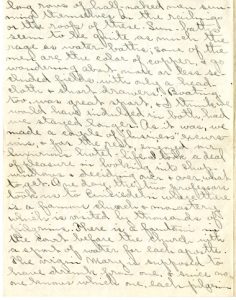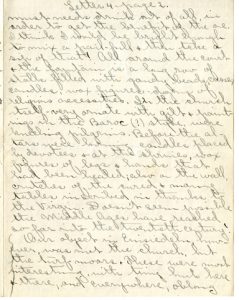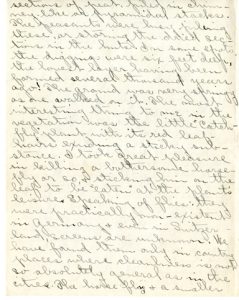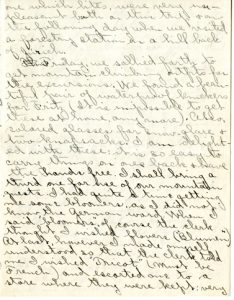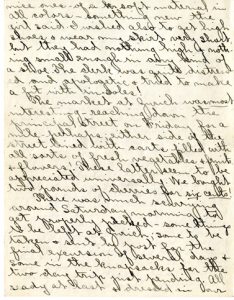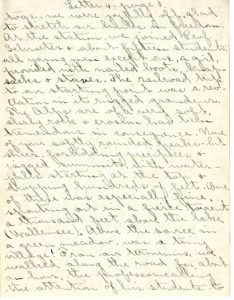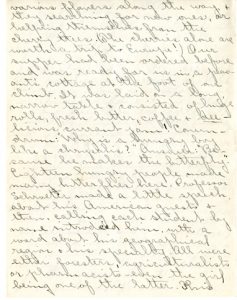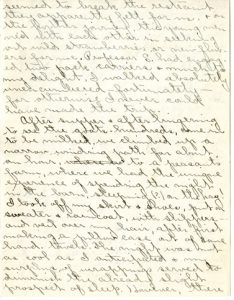Great Nebraska
Naturalists and ScientistsEdith Schwartz Clements
Letters, 1911
July 12, 1911
Letter 4 – page 1.
Zürich July 12
Wednesday – We reached Zürich Monday afternoon. Dr. Rübel, a botanist here was to meet us. When we saw a very blond, fresh-faced young man
scanning the travellers from the train with anxiety & holding up some letters with
Fred’s name on, we had no difficulty in concluding who he was. He is a handsome fellow of
Dr. Ward’s type & speaks English so well, I would have thought him English, both from looks
& speech. He apologized again because his beautiful new house is not finished & ready
to receive us. He is indepently wealthy. Took his degree in chemical engineering,
studied banking & now is absorbed in botany! His wife, a pair of twins & the baby
are located in the country for the summer. He directed us to a very nice hotel right
on the lake, which he calls “second-class,” but which Dr. W. would taboo, as “extravagant.” The dainty room & surroundings prove too much for
Fritz. However, he yields despite my protest to the temptation to stay a few days. Our
accounts indicate that (?) we will come through for $900. which is Satisfactory, so
we have a little leeway. Tuesday morning at 10:00 Professor
Schrüter of the Polytechnican called at the hotel for us for a visit to his school & dinner at his house. He is
a delightful man of 56 with long hair curling in his neck, slouch hat & general air
of negligée, quite in contrast with Dr. Rübel’s fresh timness. He brought me a “greeting from the Alps” in the shape of a nosegay
of rhododendrum. The contrast between German universities & ours is marked. Of course,
in the universities, here, the students are comparable to our post-graduates. The
work, however, is mostly lecture & very little “practicum” (laboratory), whereas we
have just the reverse.
The meal offered us was simple but very homelike, with only one meat & real cream! the first we have seen. Fortunately for Fritz who is very shy with his German, our hosts talk & understand English exceedingly
well, both can speak & understand some five or six languages.
Monday: July 17- Avers-Cresta.
My-oh! how the time has got away from me. Here we are almost six thousand feet high,
in the quiet spot I spoke of seeking. It is by
far the best thing yet! Six thousand feet does not sound so high to us Rocky mountain
dwellers, but when you know that it is as timberline for this region, it is pretty
high. The Swiss have a great fashion of posting a village on every alpine meadow &
of cutting off the vegetation for hay. It gives rather an eerie feeling to see houses
& churches against the sky line, high in the air. It is all of a piece, however, with
the necessity of making everything count & cabbage patches or potatoes or hay occupy
every available foot of ground. I must go back a little & fill up the gap, though
there was not much to tell of Zürich, which is, of general interest. Elsie would have been pleased with the swimming. I think everyone in Zürich must swim. We would see hordes of small boys, or small groups of maidens, hurrying
at any time of day with towel & suit to any of the many bath-houses. Also heads bobbing
about near there, or
long rows of half-naked men sunning themselves on the railings or the roofs of these.
Sun-baths seem to be quite as much the rage as water-baths; some of the men are the
color of copper, & go wandering about more or less secluded fields with only a head-cloth
& short drawers! Boating too was great sport, & I think we would have indulged in
both, had we stayed longer. As it was, we made a couple of “business” excursions,
& for the rest, enjoyed our luxurious hotel-life. I took a deal of pleasure in looking
into shop-windows & deciding over & over, what to get. One day, the two professors
took us to Einsiedeln where there is a famous church & monastery which is visited by thousands of pilgrims.
There is a fountain in the court before the church with a spout of water for each
apostle. The virgin Mary is supposed to have drunk from one & since no one knows which
one, each pilgrim
Letter 4 – page 2.
must needs drink out of all, in order to get the benefit of the one. I think I would
be bright enough to mix a pail-full & then take a sip of that! All around the court
& the fountain is a long row of stalks filled with gaudy beads, crosses, candles,
wax figures — dozens of religious necessities. In the church itself — very ornate
with gilt & paintings in the Baroc (?) style, were kneeling pilgrims. Before the altars were burning candles placed by devotees
& at the shrines, wax figures of legs & hands that had been healed; also on the wall,
crutches of the cured & many tables inscribed in thanks to the Virgin. Doesn’t seem
possible the Middle Ages have reached so far into the twentieth century!
Our object in Einsiedeln however, was not the church, but the turf moors. These were most interesting, with
tiny huts here & there, and everywhere, oblong
sections of peat, piled in chimney-like as pyramidal stacks. The peasants were busy
piling these, or storing the dried section in the huts. In some spots, the diggings
were six feet deep, the lowest layer having been farmed several thousand years ago!
The ground was very springy as one walked on it. The most interesting thing to me
in the vegetation was the little “catch-fly” plant with its red leaf-hairs exuding a sticky substance. I took great pleasure in
killing a bothersome horsefly or so, & sticking him on the leaf to be “eaten” at the
plant’s leisure. Speaking of flies: they were practically non-existent in Germany & even in Switzerland, screens are unknown. We have found them only in country places where cleanliness
is not so absolutely general as in the cities. The horse fly & a smaller
one which bites, were very unpleasant both on this trip & on the following day when
we visited a forestry station on a hill back of Zürich.
ThuFriday, we sallied forth to get mountain climbing outfits for the excursions. We found
a beautiful pair of waterproof knickers for Fritz (It is impossible to get these at home, anymore). Also, colored glasses for snow-glare
& two knapsacks. I am delighted with these: it is so easy to carry things on ones
back & have the hands free. I shall bring a third one for use of our mountain guests.
I had quite a time getting me some bloomers, as I did not know the German word. When
I said “bloomers,” of course the clerk thought I wished flowers (“Blumen”) At last, however I made myself understood so that the clerk told me I wished “Tricot”
(must be French) and escorted me to a store where they were kept: very
nice ones — of a h soft material in all colors — something new the girl said. I wished also to get high
shoes & wear my skirt very short, but they had nothing high & nothing small enough
in any kind of a shoe. The clerk was quite distressed and apologetic & tried to make a fit
with in-soles!
The market at Zürich was most interesting — reaching down the principal street on Friday for a mile — perhaps;
either side of the street lined with carts filled with all sorts of fresh vegetables
& fruits & flowers! These latter seem to be appreciated universally. We bought two
pounds of cherries for six cents!
There was much scurrying around Saturday morning to get properly packed — somethings
to be left at Zurich; some to be taken & sent by post for the final excursion of several days & some in
the knapsacks for the two day trip just pending. All ready at last & dressed in our
Letter 4 – page 3
togs, we were joyfully off, glad to stretch our limbs in freedom. At the station,
we joined Prof. Schrueter & about fifteen students, all young men except one, a girl, provided with nailed
boots, knapsacks, & staves. The railroad trip to our starting point was a revelation
in its rugged grandeur. The Alps are of a very soft, shaky rock & erosion has been tremendous in consequence. None
of your softly rounded peaks — but sheer, forbidding precipices & jagged summits,
with waterfalls starting at the top & dropping hundreds of feet. One of these was
especially fine, spouting out in a fierce torrent a thousand feet above the lake (Wallensee). Above the source in a green meadow, was a tiny village! From our terminus, we walked
along the road for about an hour, the professor calling the attention of his students
to
various flowers along the way & they searching for new ones, or helping themselves
from the cherry trees. (The cherries alone are worth a trip to Europe!) Our supper
had been ordered before and was ready for us in a peasant’s cottage at the foot of
our climb. It was laid on a long narrow table & consisted of huge rolls, fresh butter,
coffee & deelicious currant jam! Conundrum: “Why is a hungry boy like a chrysalis?” Answer: “Because
he makes the butterfly.” Eighteen hungry people made many butterflies here. Professor Schrueter made a little speech about his American guest & then, calling each student by name
introduced him with a word about his geographical region & his speciality. All were
either foresters, agriculturalists or pharmacists — even the girl being one of the
latter. This
seemed to break the restraint they apparantly felt for us, & on the further journey,
the young men vied with each other in seeking out wild strawberries or new flowers
for me. Professor S. had engaged two pack carriers & much to my delight, I walked absolutley unencumbered
— fortunately — for otherwise I never could have made the trip.
After supper & after lingering to see the goats — hundreds, come in to be milked,
we climbed up a narrow, winding path for about an hour, where to to a peasant farm, where we had the unique experience of spending the night in the
barn, sleeping (?) on the hay! I took off my skirt & shoes , put on sweater & raincoat,
with slippers and veil over my hair, after first making a pillow case out of some
hand-towels. The night was not as cool as I anticipated & my surplus of wrapping served
to diminish the already slight prospect of sleep. However, there
12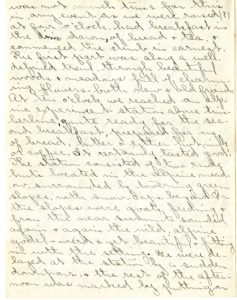
was not much time for this in any event, as we were roused (?) at four o’clock, had
breakfast in the dim dawn, of bread & tea, & commenced the climb in earnest. The first part was along
a well defined trail, through beautiful woods & meadows full of charming flowers —
both new & old friends. At ten o’clock we reached an alpine experiment station above
timberline, quite ready for the second breakfast, prepared for us of bread, butter
& either hot milk or coffee. It certainly tasted good! The station consisted of two
rude huts located in the alpine meadow, surrounded by towering green slopes, with
snow-caps beyond. On the slopes were goats feeding & from the near summits sounded
again & again the wild, alpine yodel — wierd & yet beautiful & fitting in with the setting. We were delayed at the station by
a sudden downpour & the rest of the afternoon was marked by putting on
13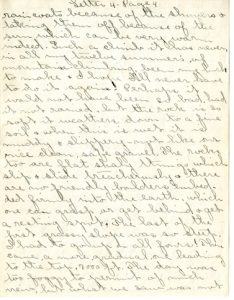
Letter 4 – page 4
raincoats because of the showers & taking them off because of the sun which can be
very warm indeed. Such a climb it has never, in all my twelve summer’s of mountain
climbing, been my luck to make & I hope I’ll never have to do it again! Perhaps it
would not have been so bad had it not rained, but the rock is so soft it weathers
down to a fine soil & when this is wet it is muddy & slippery — not like our nice
clean, safe gravel. The rocks too are flat shaly things which slip & slide treacherously
& there are no friendly boulders embedded firmly into the earth, which one can grasp
or get behind & get a resting spot. The last of the first grassy slope was so steep.
I had to go up on all fours! There came, a more gradual one leading to the top, 7000
ft. The day was too foggy to permit of much view, but what we saw was not
14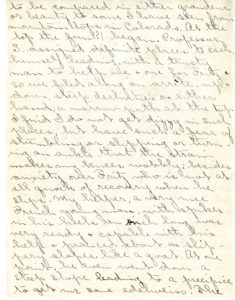
to be compared in either gradeur or beauty to some I have seen from mountain tops
in Colorado. At the top the fun(?) began. Professor S. assigned definite places to each, himself leading with a trusty man to help me &
one for Fritz so we filed along an arrête, up & down, steep declivities on either hand, a narrow path at the top. I find I
do not get dizzy in such places, but have such a fear of stumbling or slipping or
turning an ankle that the strain makes my knees wobbly; besides anxiety over Fritz who is not at all quick of recovery where he slips. My helper, a very nice French
young man, with spikes in his heels an inch long was very ready & capable with his
help & pranced about on slippery slopes like a goat. At one point, he even went down
a steep slope leading to a precipice to get me some edelweiss. The
15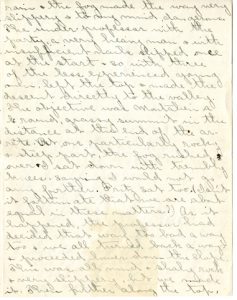
rain & the fog made the way very slippery & to my mind dangerous. The under-professor
with the party, a very heavy man & with insufficent nails slipped once at the start
& so with three of the less experienced young men, left the top & made the descent
directly to the valley. The objective was Montalier t round, grassy summit in the distance at the end of the arrête. At one particularly rocky & steep part, the fog rushed over & I sat down with trembly
knees, saying I would not go any further. Fritz sat too. (Isn’t it fortunate that we are about equal in these matters?) As it happened,
the professor had decided that way too bad a way too & we all turned back a ways &
proceeded lower down the slope. This was all mud & shaly rock & very slippery, but
we made it. Then farther along the top,
16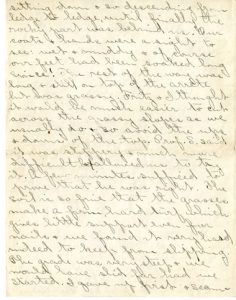
sitting down & so descending from ledge to ledge, until finally the rocky part was
behind us. Our coats & hands were a sight to see: wet & muddy & of course our feet
had been soaked long since! The rest of the way was long & still on top of the arrête but was grassy. Fritz & I thought it would be much easier to cut across the grassy slopes as we usually
do & so avoid the ups & downs of the top. Prof. S. said it was slippery & much more difficult but allowed us to try it. A few minutes
sufficed to prove that he was right. The soil is so fine that the grasses make a firm,
hard turf which gives little support even for nails & we found it very hard indeed
to keep from slipping. The grade was very steep & we would have slid far had we started.
I gave up first & scam-
17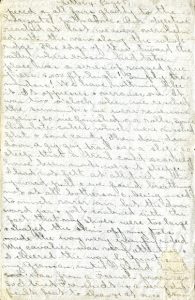
Letter 4 – page 5
pered on all fours gladly to the horizontal path above. Our objective reached at last,
we were overwhelmed with the view along the whole ridge. The edge of this, toward
the valley where erosion had taken place was a series of ragged precipices 5,000 ft
high! Simply tremendous! We have nothing like it. It appeases & overawes one. It was
two o’clock when we reached the summit & we were ravenous again, so we finished our
rolls, since chocolate cakes which were mashed flat & some candy. Then down, down,
down, a zig-zag trail over a slope so steep that a trail could scarcely have been
made, were it steepens. I had not felt at all tired on that upward pull & we found
breathing not at all bothersome being used to much rarer air, but the downward jar
& jolt combined with the fact that my shoes were too large & chafed the skin off my
toes made the way very painful indeed. My cavalier was very attentive & I cheered
the way by practising my German, until I found he and was from a French province & so I tried French. It is a very difficult feat to change
at once from
18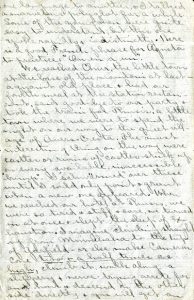
one language to another & I talked a marvelous polyglot for a while. Some of the young
men were quite easy to understand, but this one spoke rapidly & indistinctly. Here
is a good French phrase for Agusta to practice: “On en a un.”
We reached Chur, the little town at the base of the mountains at last — a quaint old place, & had
our fourth meal at the station restaurant, said good-bye to our party & took the train
for Thusis, a little town where we were to spend the night on our way to the quiet village of
Avers-Cresta. The most interesting thing on the way were castles or ruins of castles stuck up
on every available, inaccessible “bump.” I “schwärmed” over these until I could only point & grunt when a new one appeared. When we reached
our hotel at Thusis, we were so tired & stiff & sore, we turned in at once & slept the sleep of exhaustion.
Imagine climbing straight up from Minnehaha to the top of Garfield — or else make Cameron Core two & a half times as high, climb it, walk along a slippery & nerve-trying arrete for and hour & descend on the other side directly & you will get an
19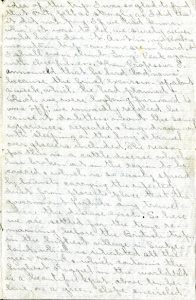
idea of the trip. I was so glad to find that Fritz felt as strongly as I did that it did not pay. If we had known what it was to be,
we surely never would have done it. As it is, no Rocky mountain trip can now seem
hard, & I shall even climb Long’s Peak again with cheerfulness. When Professor S. announced that he had “bad news” because of the final excursion of about a week,
which he had planned & which we were looking forward to was “off,” we inwardly rejoiced
because it doubtless meant the same experiences repeated & long-drawn out with “sleeping
on the hay” & travel over glaciers included. The reason for this is a cattle disease
which has broken out in the region to be covered & which is so easily spread by tourists
carrying the infected dust from place to place that the government forbids any travel
where the disease exists. So here we are settled for the time remaining before the
British trip in the highest village in Switzerland, which is inhabited all the year round & which contains the highest chapel in the
world! It is a beautiful spot, above timberline, on a green slope encircled
20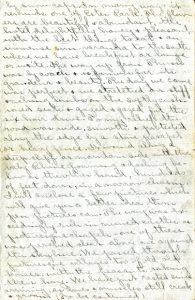
by snow caps. In many ways it reminds one of Estes Park. The flowers are beautiful & abundant, the hotel delightfully homey & pleasant with
the best things to eat & an immense sun-veranda to the south where we have breakfast or lounge
or write. The way up from Thusis was by coach & is famous for its grandeur & beauty. The day we came was perfect &
we stretched our stiff & aching limbs on the softly cushioned seats & gazed & gazed
for the six hour drive. To my relief, the road was wide, smooth & protected along
the edge by a stone parapet or heavy fence. It wound along a steep cliff or mountain
side with the baby Rhine foaming & dashing below on the other hand, hundreds of feet
down, in a narrow chasm. I will enclose a few pictures which will give you a better
idea than pen pictures can. The way was exceedingly rich in ruined castles or picturesque
chapels — one of these was perched clear above one against the skyline. We passed
through picturesque villages too of old old houses, with the peasants raking their
hay. We have just rested since arriving, as bones and muscles still creak & groan.
(To be continued).
